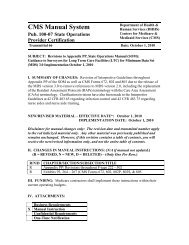LOUISIANA Community Mental Health Services Block Grant ...
LOUISIANA Community Mental Health Services Block Grant ...
LOUISIANA Community Mental Health Services Block Grant ...
Create successful ePaper yourself
Turn your PDF publications into a flip-book with our unique Google optimized e-Paper software.
Etc.<br />
o Medical Director approval<br />
All other antidepressants<br />
PROCEDURES<br />
Hospital and regional medical directors must approve all medications and specific usages of medications<br />
noted above within the “Medical Director approval required” categories.<br />
o Medical directors will keep records for each contact requesting approval for specific medication<br />
use<br />
o Medical directors will report each month to the OBH medical director requests for specific use and<br />
outcome of each action on the specific UM form that has been developed for monitoring these<br />
reviews<br />
o OBH medical director will review each action and will work closely with medical directors in the<br />
implementation of these procedures<br />
Hospital medical directors will develop a system of “rounds” attended by treating physicians/prescribers<br />
and pharmacy directors, among others, to ensure that information about medication cost and the cost of<br />
possible alternatives is available to the clinician.<br />
Patients admitted to OBH clinics taking (previously prescribed) medications requiring medical<br />
approval or prohibited will be allowed to continue the medications without medical director approval<br />
for 3 months, during which time the physician/prescriber will work with the patient to discontinue the<br />
prohibited medication (transfer to a non prohibited medication) and, as much as possible, the<br />
medications that require medical director approval.<br />
Specific budgetary targets will be developed for each region and hospital. Progress toward achieving<br />
expected targets will be monitored during the course of the fiscal year so that additional formulary changes<br />
can be made, if necessary.<br />
A significant administrative change occurred with the <strong>Mental</strong> <strong>Health</strong> Rehabilitation (MHR) program<br />
that removed the oversight of the program out from the Office of <strong>Mental</strong> <strong>Health</strong> after June 30 th , 2009;<br />
when the oversight and management of the program was transferred to the DHH Bureau of <strong>Health</strong><br />
<strong>Services</strong> Financing/ Medicaid. All staff, equipment, materials, contracts, purchase orders, processes<br />
and personnel were transferred. Starting with the new fiscal year, Medicaid began to provide all<br />
utilization management, prior authorization, training, monitoring, network, and member service<br />
activities. Under the new oversight, services remain the same as previously, and include services in<br />
the community to adults with serious mental illness and to youth with emotional and behavioral<br />
disorders. The available services include Assessment, Reassessment, <strong>Community</strong> Support, Group<br />
Psychosocial Skills Training, Counseling, and Medication Management. Optional services for<br />
children/ youth are Parent Family Intervention-Intensive, which provides intensive home-based<br />
services to assist children who are at-risk of being placed out of their homes. All authorized<br />
providers in the network are required to be accredited by JCAHO, CARF, or COA.<br />
Cultural and diversity needs in the service delivery system are under-developed, as are the special<br />
needs of the transitional age and older adult population. Service providers with specialties in these<br />
areas are under-represented, and there is need for more staff training. These areas are receiving more<br />
emphasis.<br />
The Office of <strong>Mental</strong> <strong>Health</strong>‟s (OMH) statewide Cultural and Linguistic Competence Planning<br />
Committee began its work with an initial meeting in April 2005. Soon after the hurricanes of 2005,<br />
the committee agreed to focus on hurricane related cultural and linguistic competence issues across<br />
the State. The National Alliance of Multi-Ethnic Behavioral <strong>Health</strong> Associations (NAMBHA)<br />
PART C <strong>LOUISIANA</strong> FY 2011 PAGE 73<br />
SECTION II: ADULT & CHILD/ YOUTH<br />
IDENTIFICATION & ANALYSIS OF SERVICE SYSTEM’S STRENGTHS, NEEDS, & PRIORITIES<br />
UNMET SERVICE NEEDS & PLANS TO ADDRESS UNMET NEEDS
















